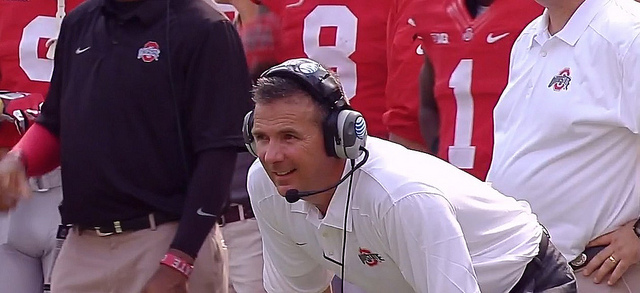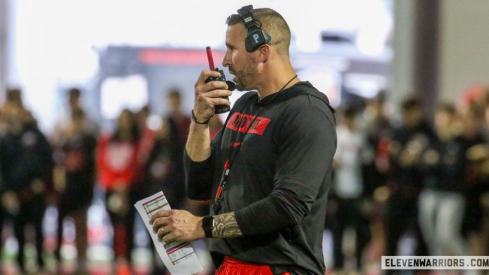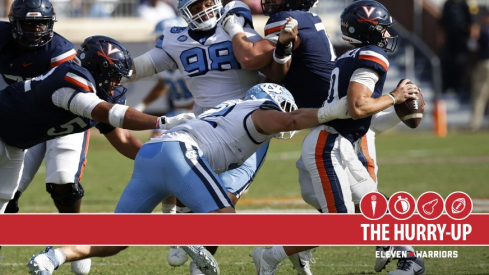
One glance at Urban Meyer’s overall coaching record quickly paints the picture of success. He’s won at an 84 percent clip at schools where winning was thought to be impossible and others that view winning as the only thing. But even more impressive is Meyer’s ledger in the almighty must-win bowl games. He owns a 7-1 record and a higher win percentage than regular season games.
Part of the reason stems from Meyer coaching the better team in many of the games. That doesn’t guarantee a victory in December and January, though. In his greatest triumph – a 41-14 win over Ohio State to capture the 2006 national championship – Meyer’s team played an underdog role. The Buckeyes were heavy favorites and Meyer used those slights – real or imagined – and ingrained them into his team’s psyche.
“I’d like to thank all those people. Our pregame speech was easy,” Meyer said after the game.
Said Florida receiver Dallas Baker: “Nobody never gave us a chance at all. We came here with a chip on our shoulder and something to prove. Nobody gave us a chance, but finally we can throw up the No. 1.”
Motivation has long been a masterstroke of Meyer’s. It started at Bowling Green when he convinced a group that was 2-9 the season before his arrival that they were capable of accomplishing much more than that. The Falcons were 17-6 in Meyer’s two seasons as head coach. At Utah, doubters persisted throughout the 2004 season. No way could one of the little guys make its way to the BCS. Utah did. Meyer’s offense would never work in the SEC, they said. It did, and dominated college football in the process.
Meyer is the definition of a big-game coach. He’s 22-3 against rivals, 2-2 in conference title games, 7-1 in bowls and 2-0 in national championship games. The importance of bowl games is very real for Meyer. Wins put an exclamation point on good seasons and act as a springboard for the next year.
“It’s terrible to lose a bowl game,” Meyer said after going out a winner at Florida. He admitted his lone bowl loss to Michigan in the 2008 Capital One Bowl still haunts him.
Whether it’s Southern Miss in the Liberty Bowl, Oklahoma in the national championship game or Iowa in the Outback Bowl, Meyer and his staff take the same steps in preparing teams for the game itself and the mental and physical burdens. The same is seen in rivalry games. They’re treated differently – like bowls – for a reason.
The overwhelming end of season goal is to win, which ensures positive results on the field, in the locker room and on the recruiting trail. Not to mention a happy fan base and administration.
“You definitely don’t want to end the season on a losing note,” former Florida quarterback Tim Tebow said. “It definitely does take a little bit of the positive out of the season.”
To many, bowls might signal a relaxed atmosphere, sunny skies, golf courses and beaches. For coaches, however, it brings forth an entirely different set of conditions – the biggest: pressure.
“Everyone wants to talk about the pressure now like it's some mounting thing,” Northern Illinois head coach Rod Carey said prior to the Huskies’ loss to Bowling Green in the MAC championship game, denying them a second consecutive BCS bid. “Hey, there has been a lot of pressure on us all year because we put it on ourselves. Pressure isn’t a bad thing. It’s a good thing because that’s what gets you to perform.”

A suffocating Falcon defense ultimately doomed Northern Illinois. But it was evident from the game’s outset that the Huskies were wound too tight. And that was in a game just to qualify for a BCS game, not the bowl itself.
Some of the game’s greatest coaches won big during the regular season only to stumble in games carrying more significance. Bo Schembechler was 5-12 in bowl games and just 2-8 in the Rose Bowl; John Cooper’s dismal 3-8 bowl record at Ohio State was a factor in his undoing; and Bob Stoops, dubbed “Big Game Bob” early in his career, fashions a 3-5 record in BCS games, including three defeats with the national title on the line.
At Florida and Ohio State, expectations are as outsized as anywhere in the country. Still, the wins for Meyer pile up like snow in the Alps. In the 2009 national championship game, Meyer’s Gators limited Oklahoma’s record-setting offense to seven points over the first three quarters and 14 for the game. The Sooners totaled 363 yards of offense with only 256 yards passing coming from Sam Bradford. The Heisman-winning quarterback struggled, barely completing 50 percent of his passes and throwing two interceptions.
The bigger the pressure, the bigger the expectations, the likelihood of Meyer succeeding rises. He is, after all, undefeated in BCS bowls. The number could grow come Jan. 3 in the Orange Bowl.
“Momentum is an extremely valuable thing,” Meyer said, “and when you lose a game, it’s difficult.”

